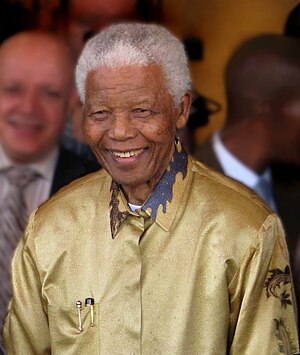If you are a news junkie like me, you have spent the last week listening to tributes to the late Nelson Mandela. Clearly, he was a unique individual and inspirational leader who was able to change the course of his nation of South Africa and put an end to the shameful racial discrimination system of apartheid. As many point out, the single most compelling thing about his life was the fact that he was able to forgive his captors, who had imprisoned him for 27 years. He came out of prison spreading a message of hope and possibility, rather than the violent rhetoric he had initially come to be known for.
In the case of Nelson Mandela, this was not simply a matter of rebranding or changing his message to meet the changing tide of public relations. He spent years reflecting and recognized that his initial strategy was not going to bring about the type of change he hoped to achieve. He realized that sometimes negotiations and communications are more powerful than guns and violence and recognized that he had a mandate from the people of the world to change things. In other words, his change was real, not marketing hype.

Apart from the man himself, I believe the world mourns the loss of an authentic leader. In marketing we talk a lot about authenticity and the need to ensure the close alignment between what a brand claims and what it actually does. We stress that in the transparent world of social media, authenticity is even more vital. Those who do not walk the talk can be easily outed and a few viral posts documenting hypocrisy can ruin a brand and a business. This has become our mantra and we recite it frequently.
But, unfortunately, I believe we have all become used to a somewhat lower standard of authenticity. BP airs commercials about how much they care about the environment, have invested in clean technology, and how they love the gulf coast. Do you believe them? I certainly don’t. I believe they spent a lot of money on these efforts, not because they wanted to, but because they had to. Like all corporations, they are driven by profits. Right now they will lose money if they do not clean up their act and convince a skeptical public that they are the good guys. I am happy that the beaches are getting less polluted, but this is not authenticity. This is marketing hype.
I do believe authenticity matters and that consumers know when what they see is the real thing. There are entrepreneurs who are interested in both doing good and making money. Robin Chase, founder of both Zipcar and Buzzcar, is often quoted about the positive environmental benefit of her business ventures and the amount of carbon saved. The founder of Tom’s shoes is lauded for building a successful business by giving away shoes. These individuals come off as authentic. Right now we believe they are, but clearly time will tell.
Currently the public is disillusioned by political leaders who change their stories on an as needed basis, and corporate leaders who appear to do anything to earn a buck no matter the consequences. Recently, we have seen bank after bank pay out huge fines for their role in the financial crisis, and yet no one seems to be going to jail or even fully acknowledging guilt. These organizations and the people who run them are often described as insincere and in some cases, even evil. This has led to many financial brands, such as Bank of America and Chase, being perceived as uncaring and greedy, rather than as enablers of economic development. Not exactly what their marketing managers had in mind.
There is a hunger for authenticity and values and those that fill this void will certainly benefit. We have seen this in the local food movement, as small farms and community supported agriculture have flourished. Many folks simply don’t want large corporations telling them to trust the fact that they are green and that they are producing healthy foods; they want to visit the local farm down the road, see for themselves what is growing and actually reduce the carbon footprint of what they consume. Marketing hype will work to some extent, but many long for real change and true commitment.
So, while the world continues to mourn the loss of a remarkable individual, perhaps we as marketers can learn the valuable lesson that sometimes real matters, and that having principles and standing by one’s beliefs can make a world of difference.






